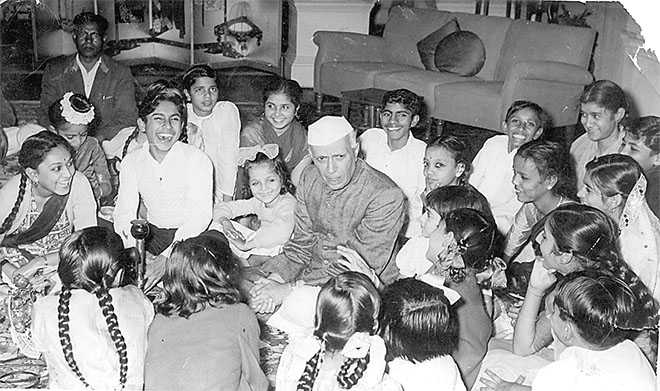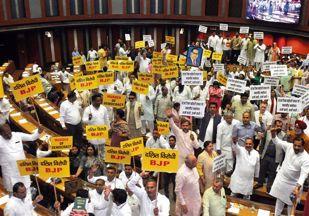
Man of many parts: It is irrefutable that Nehru established a constitutional democracy and healed a country ravaged by poverty, paucity and pain.
Partap Singh Bajwa
Rajya Sabha Member
Facts are facts, and will not
disappear on account of your likes
— Jawaharlal Nehru
In today’s dystopian, ‘post-truth’ world, where ‘alternative facts’ from ‘Whatsapp universities’ hold more value than actual history, Nehru’s words are all the more relevant. It does not matter which ideology you are inclined towards or what government is in power — facts are simply facts. The Supreme Leader may have you believe otherwise. The ‘North-Korean Media’, Twitter trolls and the RSS may have you believe otherwise. But facts are, in the end, facts. And it is but an unassailable fact, that Jawaharlal Nehru liberated and built modern India. While other post-colonial nations crumbled, he established a stable, liberal democracy; one that we take for granted today. No amount of revisionism, personal vilification or ‘alternative facts’ will change the fact that when we look around, most of what we see is Nehru’s India.
India is a unique nation. Due to our range of languages, religions and divisions, most early commentators claimed the ‘Indian Experiment’ would fail. And ground realities seemed to support this view. India at independence was a nation of 33 crore people, of which only 12 per cent were literate. The average life expectancy was 32 years, and 80 per cent of the population was below the poverty line. The nation was not one nation at all, but a motley mishmash of provinces and princely states. The Partition had yielded close to 80 lakh refugees. Within three months of independence, India was at war. We stood at the brink of anarchy, and it would have been easy to proclaim the need for a ‘strong government’, military or otherwise.
Melding disparate nationalities
And yet, that did not happen. Nehru’s Interim Government helped establish relative peace and drafted a Constitution that united the nation. A Constitution that, ideologically, owed much to Nehru’s own 1946 Objectives Resolution. That a free and fair vote was given, repeatedly, to an illiterate, communally divided and hitherto not democratically versed polity was a massive gamble, and a testament to Nehru’s commitment to the Constitution. Our democracy owes a great debt to Nehru.
The 7% growth era
The task of economic growth, however, yet lay ahead. Nehru focused on a few key areas: education, research, industrial growth and agriculture. In education, his achievements are well-known; several IIMs, IITs and AIIMS were set up, providing the technical expertise crucial for industrialisation. Research institutes such as the NSSO, CSO, DRDO and the Atomic Energy Commission were established. Nehru was desperate to inculcate a ‘scientific temper’ in Indian society, the benefits of which we see in our space programme and IT industry. For the ‘hardware’ of industrialisation, Nehru’s government spent handsomely on power, minerals, transport and communications. Three massive steel plants were set up at Rourkela, Bhilai and Durgapur. Steel production rose from just 10 lakh tonne to over 60 lakh tonne. We went from importing 90 per cent of our industrial goods in 1947 to 40 per cent in 1960. Dams such as the Bhakra Nangal, Hirakud and Nagarjuna Sagar were built under Nehru’s leadership. Indeed, industrial growth averaged 7 per cent during his tenure.
Self-sufficiency despite a war
To hasten agricultural growth, Nehru first abolished the exploitative zamindari system. He established agricultural credit institutions and increased subsidies; the quantum of credit and subsidies grew from Rs 23 crore in 1950 to Rs 365 crore in 1965. The Indian Agricultural Research Institute was reformed and over 35 State Agricultural Universities were established. Fertiliser and pesticide factories were set up. Such measures ensured that Indian agriculture grew by 4 per cent between 1950 and 1965. Indeed, a country wracked with famine in 1947, saw no deaths during the Bihar drought in 1965 — Nehru’s India had almost achieved self-sufficiency.
Providing a promising alternative
Even Nehru’s foreign policy, that oft-criticised aspect of his legacy, provided its benefits. Nehru literally created India’s foreign policy machinery, by establishing the IFS and setting up embassies. His policy of non-alignment provided a promising alternative to the Cold War. India was one of the few countries that received aid and technology from both the West and the Soviet Bloc. His moralistic stand against exploitation across the globe engendered respect and gave India a global standing that an impoverished, post-colonial nation could barely hope for.
An article attempting to list Nehru’s achievements is limited by its very nature. In almost every aspect of India’s development, Nehru made contributions that serve us even today, so enumerating them all is nearly impossible. These contributions are not subjective opinion, but irrefutable facts. No one can deny the fact that Nehru established a constitutional democracy, where none existed before. No one can deny the fact that Nehru built institutions that have stood the test of time. No one can deny the fact that Nehru stabilised and healed a country ravaged by poverty, paucity and pain. Nehru forged a nation, and will always remain a leading founding father of India. Happy Birthday, Chacha Nehru.



























